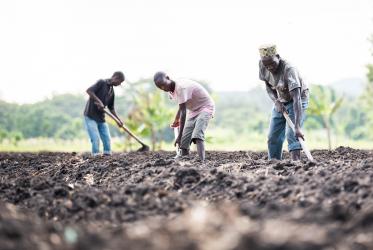At the 42nd Committee on World Food Security (CFS) in Rome on 12-15 October, the intergovernmental body continued its quest to coordinate a global approach to food security.
The latest (2015) edition of the report “The State of Food Insecurity in the World” (SOFI) reveals that 793 million people are undernourished globally. Though this number is down by 167 million over the last decade, the pace of hunger reduction has fallen short of the internationally adopted “Millennium Development Goal” of halving the number of chronically undernourished people.
Additional findings shared at a side-event, “Cultivating Agroecology for Food and Agriculture” by civil society organizations during the CFS included:
— Smallholders and peasants make up almost half the world’s people, and they grow at least 70% of the world’s food.
— Most of the worlds’ food is grown from peasant-bred seed without the industrial chain’s synthetic fertilizers. Peasants breed and nurture 40 livestock species and almost 8,000 breeds, as opposed to the industrial food chain, which focuses on far fewer than 100 breeds of five livestock species.
— Corporate plant breeders work with 150 crops but focus on barely a dozen.
— What remains of the world’s declining fish stocks comes from 336 species accounting for almost two-thirds of the aquatic species we consume. Of 35,200 edible aquatic species, only 336 species from 115 families of fish and invertebrates are commercially farmed. The only group that has demonstrated the capacity to monitor and manage the wide variety of fish in an ecologically sound manner are artisanal fisher folk.
— 78% of the planet's poor are found in rural areas.
These facts urgently underscore our ethical imperative to help the world’s poorest farmers find the resources they need to break the cycle of poverty, said Bernhard Walter, member of the Food for Life Campaign strategy group of the WCC-Ecumenical Advocacy Alliance and staff member of Brot für die Welt.
The SOFI 2015 report identified “social protection” schemes as a critical tool to eradicate hunger, Bernhard Walter pointed out. “This strategy is much more than a hand-out,” he said, “rather it is the right of the very people who are the guardians of biodiversity and sustainability of our planet, who will ensure that we will have sufficient and nutritious food for the decades to come, in spite of the potential damage related to climate change.”
CFS explores link between right to food, right to water
The CFS also systematically considered the world’s access to water, and the link between the right to food and the right to water. A report by the High-Level Panel of Experts on Food Security and Nutrition entitled “Water for Food Security and Nutrition” highlighted the value of water as common public good, as well as its centrality in ecosystem functions and territories.
The CFS discussed issues raised by the panel’s report, including:
— placing a special emphasis on small-scale food producers and workers;
— recognizing the necessity of extraterritorial human rights obligations of states, given the trans-boundary nature of water;
— reaffirming commitments to the progressive realization of the right to adequate food as a central component to the work and mandate of the CFS;
— bringing forth the human right to water as a core aspect of the realization of the right to adequate food, recognizing the multiple dimensions and uses of water;
— ensuring regulations safeguard public interests while protecting the ecosystem functions of water;
— clearly prioritizing vulnerable and marginalized populations, particularly women and girls; and
— improving access to drinking water in the workplace.
“We can only improve food security by looking at it through the lens of human rights, by overcoming poverty and by ensuring gender justice,“ said Dr Manoj Kurian, coordinator of the WCC-Ecumenical Advocacy Alliance and its Food for Life Campaign. “Nations will need to be committed to providing the resources, ensuring active participation of the civil society, and protecting policymaking from undue corporate influence and capture,” Kurian added.
About the CFS
The CFS was formed in 1974 as an intergovernmental body serving as a forum for review and follow-up of food security policies. The CFS is working to develop a global strategy for food security and nutrition by promoting policy convergence and accountability, sharing best practices, and supporting and advising countries and regions on food security and nutrition.
In 2009, the CFS reformed to include other key players such as civil society and non-governmental organizations (represented by the Civil Society Mechanism), representatives of private sector associations and private philanthropic foundations.






